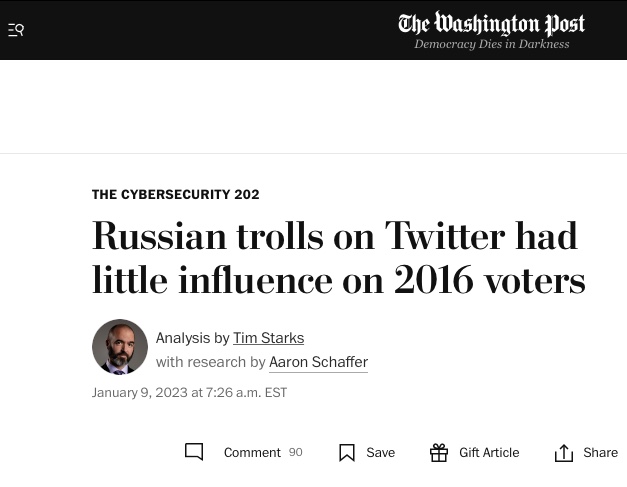Chris Hedges Describes our Self-Destructive Proxy War with Russia in Ukraine
Chris Hedges describes the dire situation. At the end of this passage he ties in the poison of Russiagate, as exposed by the Twitter Files and the recent reporting of Matt Taibbi:
The near hysterical calls to support Ukraine as a bulwark of liberty and democracy by the mandarins in Washington are a response to the palpable rot and decline of the U.S. empire. America’s global authority has been decimated by well-publicized war crimes, torture, economic decline, social disintegration — including the assault on the capital on January 6, the botched response to the pandemic, declining life expectancies and the plague of mass shootings — and a series of military debacles from Vietnam to Afghanistan. The coups, political assassinations, election fraud, black propaganda, blackmail, kidnapping, brutal counter-insurgency campaigns, U.S. sanctioned massacres, torture in global black sites, proxy wars and military interventions carried out by the United States around the globe since the end of World War II have never resulted in the establishment of a democratic government. Instead, these interventions have led to over 20 million killed and spawned a global revulsion for U.S. imperialism.
In desperation, the empire pumps ever greater sums into its war machine. The most recent $1.7 trillion spending bill included $847 billion for the military; the total is boosted to $858 billion when factoring in accounts that don’t fall under the Armed Services committees’ jurisdiction, such as the Department of Energy, which oversees nuclear weapons maintenance and the infrastructure that develops them. In 2021, when the U.S. had a military budget of $801 billion, it constituted nearly 40 percent of all global military expenditures, more than the next nine countries, including Russia and China, spent on their militaries combined.
As Edward Gibbon observed about the Roman Empire’s own fatal lust for endless war: “[T]he decline of Rome was the natural and inevitable effect of immoderate greatness. Prosperity ripened the principle of decay; the cause of the destruction multiplied with the extent of conquest; and, as soon as time or accident had removed the artificial supports, the stupendous fabric yielded to the pressure of its own weight. The story of the ruin is simple and obvious; and instead of inquiring why the Roman Empire was destroyed, we should rather be surprised that it had subsisted for so long.”
A state of permanent war creates complex bureaucracies, sustained by compliant politicians, journalists, scientists, technocrats and academics, who obsequiously serve the war machine. This militarism needs mortal enemies — the latest are Russia and China — even when those demonized have no intention or capability, as was the case with Iraq, of harming the U.S. We are hostage to these incestuous institutional structures.
Earlier this month, the House and Senate Armed Services Committees, for example, appointed eight commissioners to review Biden’s National Defense Strategy (NDS) to “examine the assumptions, objectives, defense investments, force posture and structure, operational concepts, and military risks of the NDS.” The commission, as Eli Clifton writes at the Quincy Institute for Responsible Statecraft, is “largely comprised of individuals with financial ties to the weapons industry and U.S. government contractors, raising questions about whether the commission will take a critical eye to contractors who receive $400 billion of the $858 billion FY2023 defense budget.” The chair of the commission, Clifton notes, is former Rep. Jane Harman (D-CA), who “sits on the board of Iridium Communications, a satellite communications firm that was awarded a seven-year $738.5 million contract with the Department of Defense in 2019.”
Reports about Russian interference in the elections and Russia bots manipulating public opinion — which Matt Taibbi’s recent reporting on the “Twitter Files” exposes as an elaborate piece of black propaganda — was uncritically amplified by the press. It seduced Democrats and their liberal supporters into seeing Russia as a mortal enemy. The near universal support for a prolonged war with Ukraine would not be possible without this con.




